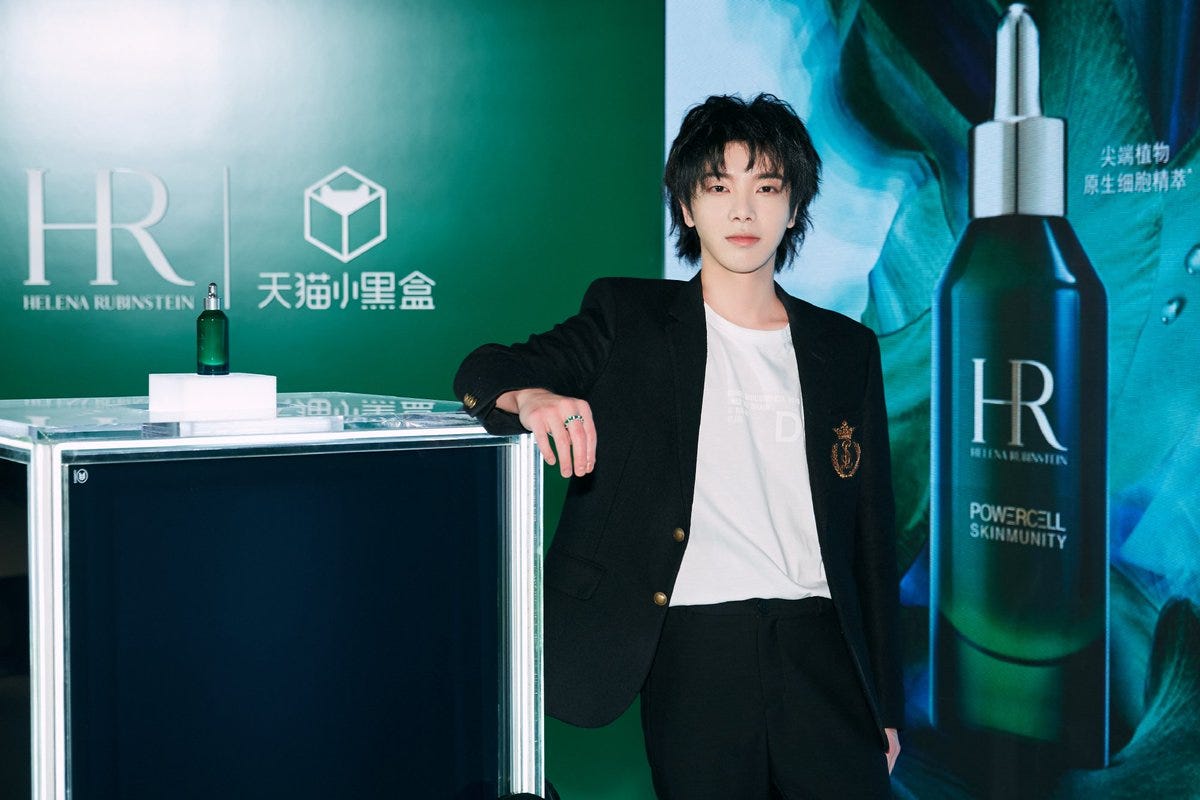Why Kuaishou’s Quality Content Play Is So Important
Plus: The coming wave of brand-funded content, Hey Tea's tangerine tearjerker, and the cancelling of Zheng Shuang.
Published three times per week, the Content Commerce Insider newsletter highlights how brands create content to drive revenue, globally. If you have received our newsletter from a friend or colleague, we hope you will subscribe as well and follow us on LinkedIn and Instagram.
As Kuaishou gears up for its $6 billion IPO in Hong Kong next month, the video platform is enhancing its efforts to become a source of high-quality content, as it evolves from its roots as a source of earthy amateur videos made by and for residents of lower-tier cities and rural areas.
Over the past year, Kuaishou has sought to widen its appeal, whether by giving away RMB 1 billion ($150 million) as the exclusive sponsor of the 2020 CCTV Spring Festival Gala (the world’s most-watched TV program), convincing Mandopop legend Jay Chou to launch his first mainland Chinese social media account and grant rights to his music, or partnering with JD.com to promote e-commerce livestreaming. Kuaishou even ventured into arthouse cinema with the exclusive distribution of indie director Zhang Wei’s “The Empty Nest” (空巢) on the platform last May.
Kuaishou will not sponsor CCTV’s Lunar New Year gala again this year, having lost out to Pinduoduo (since reported to have been replaced by Douyin following scrutiny of employee deaths and its work culture). But that doesn’t mean it will sit out the holiday on the sidelines.
The platform has launched a “Warm Cinema” (温暖电影院) as a Lunar New Year gift of sorts to its core audience, featuring a series of short films by the internationally acclaimed Jia Zhangke, notable brand film director Zhang Dapeng, production company Mahua FunAge, and Kuaishou creator Wonderful Museum (奇妙博物馆). Each of the films was inspired by real-life experiences of ordinary Kuaishou users, deploying top-notch production values to transform them into the heartwarming narratives of family, friendship, love, and nostalgia.
Kuaishou reportedly plans for the “Warm Cinema” to be an ongoing feature on the platform, with more directors and creators invited to participate in making content that fits in with its brand slogan of “embracing every life.” So far, the initiative has found a receptive audience, with its Weibo hashtag drawing nearly 60 million views.
Until now, Kuaishou has been heavily dependent on entertainment livestreaming, in which fans of performers give virtual gifts and tips, with the platform taking a cut. In the first nine months of 2020, livestreaming accounted for nearly two-thirds of Kuaishou’s revenues. But authorities have been cracking down on the free flow of money to online entertainers, with new regulations issued late last year that mandated real-name registration for both the givers and recipients of virtual gifts, ordered platforms to set limits on how much users can give, and banned minors from giving online gifts.
Kuaishou is expected to take a major hit to its revenues as a result and its future prospects will depend on its development of other sources of income, whether through advertising, e-commerce, or paid content.
Mentioned in today’s newsletter: Adidas, Airbnb, Amazon, Bilibili, Dove, Fenty Beauty, Geoskincare, Helena Rubenstein, Hey Tea, Hulu, JD.com, KFC, Kuaishou, Li Ning, Meituan, Netflix, Ordos, P&G, Pinduoduo, Prada, REI, Sprite, Swisse, Unilever, Vipshop, Vivo, Weibo.
Ongoing Pandemic to Fuel Brand-Funded Content in 2021
by Avery Booker
With consumers around the world still spending a significant amount of time at home — whether by choice or as required by law — traditional marketing strategies will become even more obsolete in 2021. Unlike in years past, when luxury and fashion houses showcased their brand power via splashy, VIP-filled bashes and over-the-top fashion shows, it is now necessary to adopt more subtle approaches to influencing consumers still contending with the Covid-19 pandemic.
For a growing number of brands, the most effective approach is through content, primarily in the form of film or video infused with the brand’s presence, though not always in an obvious manner. Often, a viewer will get through an entire program with only the faintest realization of the brand’s hand in production until the closing credits, and that’s the point. Numbed by ubiquitous advertising (both online and offline), consumers have become harder to reach through traditional advertising alone. By providing a measure of entertainment with their marketing, brands are able to retain viewer attention for significantly longer periods of time than with traditional advertisements.
“[Long-form, brand-funded content] is a fairly new medium that has surged in the last three to five years,” producer Marcus Peterzell said in 2019. "Instead of branded entertainment, brands are actually funding features, documentaries — sometimes full-length pictures. Some go into movie theaters, on Netflix or Hulu, where the brand takes a back seat [in terms of on-screen presence]. They're really turning the film over to the director. There's no one perfect formula, but it's exploded as a new medium to utilize."
Peterzell could not have foreseen the impact that the Covid-19 pandemic would have on brand-funded content, but it has been significant. In recent months, KFC (a leader in content-commerce marketing strategy) released the tongue-in-cheek television film “A Recipe For Seduction” on Lifetime, while outdoor retailer REI produced the feature “The Dark Divide” via its REI Co-op Studios imprint.
Nick Cakebread of Gusto Luxe recently told CCI that this type of content has become a major focus for brands along with e-commerce livestreaming. “For our clients, nearly every major campaign we’ve run this year has involved livestreaming, brand-funded programs, or brand collaborations, often in some combination,” he said. “As China’s social media platforms become increasingly e-commerce-capable, our emphasis is on driving content to commerce.”
The question for any brand planning for another impossible-to-predict year is just how much brand-funded content to add to the marketing mix. For those facing resistance from consumers to sitting through advertisements, it’s a no-brainer, and for many others, experiments with branded films (which are longer than an ad but shorter than a feature film) have built the confidence to move into longer-form content.
Samantha Glynne, Global Senior Vice President of Branded Entertainment at Fremantle, recently told Advanced Television: “Content is a great way to highlight brand purpose — much more effective than a 30-second spot. So brands that have had a story to tell during Covid times, about their place in the community for example, can really benefit from branded entertainment now. That could be Unilever, P&G, Amazon, or other e-commerce brands.”
In China, where long-form brand-funded content has become widely accepted, there are a growing number of outlets for this content. Short video apps like Douyin and Kuaishou are massively popular, while video streaming pioneer Bilibili has moved rapidly to increase its footprint in the long-form content realm. Last year’s lockdowns created an opportunity for platforms, brands, and content creators to collaborate and innovate.
For brands, the path to getting consumers to accept long-form branded content has been paved by educational and lifestyle programming. “From coding to cooking to DJing, video [on YouTube] lends itself well to answering “how-to” queries, but it’s tough to offer truly educational content in a thirty-second video,” CCI columnist Tanya Van Gastel recently noted. “The same goes for Bilibili...In May 2020, lifestyle content (fashion and vlogs) overtook gaming and anime for the first time to become the number one content category on the platform. Bilibili's ranking of most popular content also shows that beauty and fashion-related videos are amongst the highest ranked videos.”
Having honed their skills via short films over the past several years, we can only suspect that top luxury and fashion brands will invest more in brand-funded content. The opportunity is simply too significant, especially given that many core consumers are likely to continue spending extended amounts of time at home and online. The key for these brands is to nail the balance between content and commerce, working to create content that both entertains and includes some kind of path to purchase. It can be done, and if anyone is going to do it well it will be image-focused high-end brands.
Brand Film Pick: Hey Tea’s Auspicious Oranges
Oranges and tangerines figure prominently in the symbolism of the Lunar New Year in China, particularly as gifts, a tradition that originated in the southern part of the country, where the phrase “giving tangerines” (song gam, 送柑) sounds like “giving gold” in Cantonese.
The trendy beverage chain Hey Tea plays on these associations for its series of two brand films released ahead of the holiday, with the fruit serving as a Proustian starting point for meditations on family and love.
“Orange: Part One” recounts a young man’s childhood memories of sharing oranges with his grandfather during a close and happy period in their relationship, and a subsequent rift as the boy entered adolescence. But the grandfather’s care, expressed through a humble snack that includes a peeled tangerine, brings them together again.
The second film is a romance with a storyline that parallels that of the first: a woman peels a tangerine as she reflects on falling in and out of love with her husband, who is about to leave for good. But before he heads out the door, he asks what she will have for dinner, bringing a smile to both of their faces.
Only at the end of each film is Hey Tea’s brand mentioned with a discreet plug for its latest limited-time drink, “Very Tangerine Blast.” While Hey Tea often works with global brands — from Airbnb to Fenty Beauty to Adidas — on collaborations to promote new products, its Lunar New Year film shows that it is just as adept at marketing on its own via branded content.
News From China
Zheng Shuang has been canceled. Following allegations that the actress abandoned two children born through surrogacy in the United States, brands raced to distance themselves from her, starting with Prada, which had just appointed her as an ambassador earlier this month, and followed by more than ten others
Further fallout: Zheng was criticized by China’s Central Political and Legal Committee, the ethics committee of the China Television Artists Association, state broadcaster CCTV, and People’s Daily online, among others. She was also officially blacklisted by the National Radio and Television Administration, which means that three upcoming TV dramas that she starred in will be shelved, representing losses estimated at RMB 700 million ($108 million) for the three productions.
In addition, Baidu’s short video platform, Haokan Video, reportedly dropped plans for an upcoming interview series hosted by Zheng, her acting awards have been rescinded, and her publisher is requesting that her books be taken off bookstore shelves.
Are Hua Chenyu and Zhang Bichen next?
Though nowhere nearly as salacious as the details of the Zheng Shuang scandal, the popular singers Hua Chenyu and Zhang Bichen are also facing greater scrutiny over having a child out of wedlock. Last week Zhang, who previously dated Hua, announced that she gave birth in 2019 to a daughter fathered by Hua, who has acknowledged his paternity and reports that he is taking an active role in co-parenting the child.
Though both Hua and Zhang rose to stardom by winning Chinese talent competitions more than five years ago, Hua reached another level of celebrity in recent years following his appearance on another reality show, “Singer 2018” (歌手2018) and now has more than 30 million followers on Weibo. Brands have taken notice, with Helena Rubinstein, Ordos, Li Ning, and Sprite among those that have added him to their rosters over the past year, which also saw the launch of Hua’s own brand, Born to Love.
While Hua’s fans have been pretty open-minded about the recent revelations of his private life, Chinese society as a whole remains fairly conservative on matters of marriage and children, and it remains to be seen if there is any further impact to Hua’s standing as a result.
“Sisters” and the next wave of female-focused content.
Last summer’s groundbreaking Mango TV hit “Sisters Who Make Waves” (乘风破浪的姐姐) is back, barely four months after the season one finale. The second season premiered on January 22, with bigger names in its lineup of 30 female celebrities over the age of 30, and more brand sponsors, with a total of 15.
Dairy brand Yili Satine is the title sponsor, and others of note include Vipshop, Vivo, Meituan, Dove, Swisse, and Geoskincare. And if the first season was any indication, we can also expect to see more brands sign deals with top performers as the season progresses. Interestingly, the current competition on “Sisters” is skewing older than in season one, with 11 contestants over the age of 40 (including Cecilia Cheung) compared to five in the previous edition.
News in English
China’s tech anti-monopoly push could be good news for global brands, which may see greater autonomy, flexibility, and access to consumer data. Marketing Interactive
Netease becomes the next big tech company to move into video with the announcement of a knowledge-oriented short video platform. Dao Insights
Short videos about economics and wealth management are trending on Douyin, with more than 29 million creators producing content for an audience that exceeds 100 million. SCMP
China’s cross-border e-commerce trade volume rose by more than 31% in 2020, as online platforms became pretty much the only route for domestic consumers to obtain overseas products. Global Times
Manufacturers from China and five other Asian nations are banding together to pressure Western fashion brands for better terms. Reuters
China surpassed the United States as the top destination for foreign direct investment last year, with $163 billion in inflows. CNBC
“Mega-brands seem unstoppable”: Strong spending by Chinese consumers has helped propel luxury stocks such as LVMH, Kering, and Hermès to record highs over the past two months. Bloomberg
Luxury brands Gucci and Loewe are tapping into consumer nostalgia through cartoon collaborations for their Lunar New Year campaigns. Vogue Business
Hermès quietly launched sales of beauty products on Tmall prior to the official opening of its flagship store on the platform on January 22. WWD
Tmall released a list of the top-selling products for the upcoming Lunar New Year, with meal kits, holiday outfits for pets, and coffee gift boxes among the most sought after. Dao Insights
After selling off its Honor smartphone brand last year, Huawei is reportedly in talks to sell two other premium brands, Mate and P, and could eventually exit the high-end phone market. Reuters
The second annual Tencent Music Entertainment Awards had a decidedly global bent, with Taylor Swift, Blackpink, and JJ Lin among the honorees. Bandwagon
We’ve Got China Covered
China Film Insider: Upcoming Launch of “Steam China” Has Gamers Worried
Jing Daily: The New Wellness Trend in China Is Beauty Snacks
Jing Culture & Commerce: What Pop Mart’s IPO Signifies for the Art Toy Market






